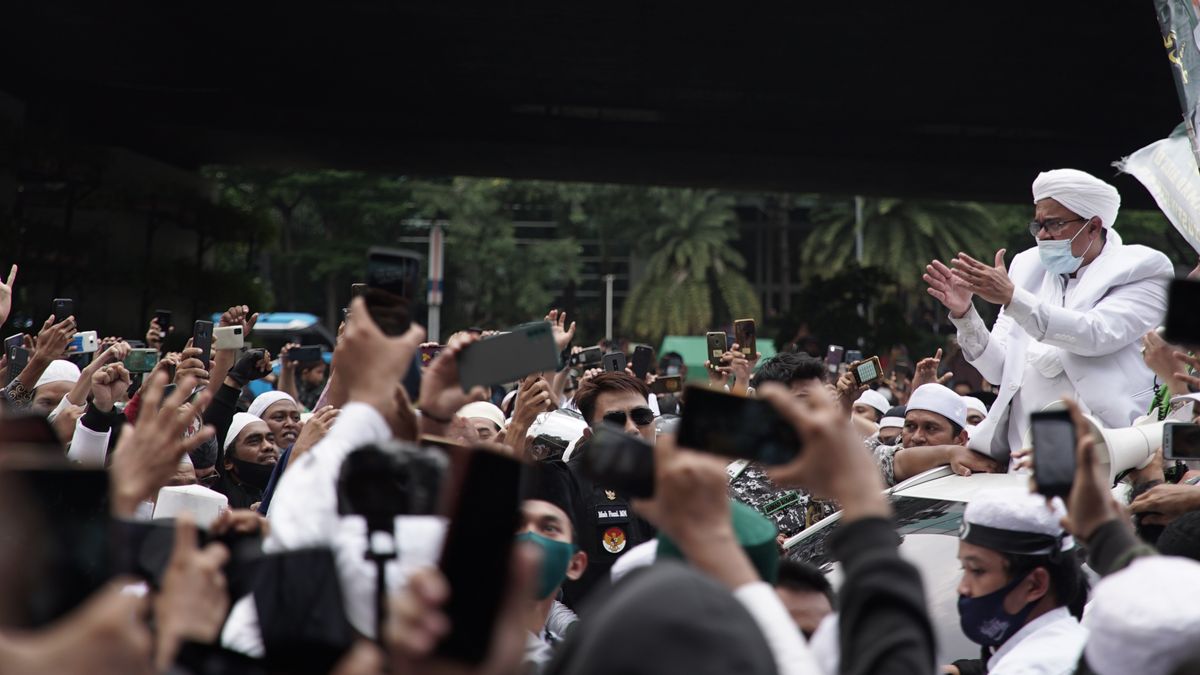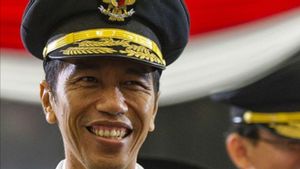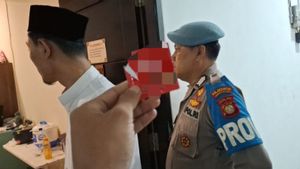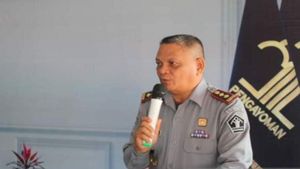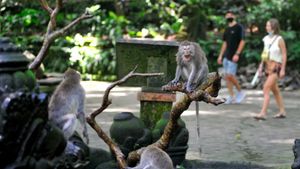JAKARTA - The Coordinating Minister for Politics, Law and Human Rights (Menko Polhukam) announced the ban on all activities of the Islamic Defenders Front (FPI). Later FPI will no longer have a legal position as a community organization (ormas) or an ordinary organization. As a mass organization, FPI has come a long way. What's the history of FPI like?
Mahfud explained, de jure FPI since 20 June 2019 has disbanded as a mass organization. However, FPI as an organization is considered by the government to carry out activities that violate order, security and are against the law.
"The government prohibits FPI activities and will stop any activities carried out by FPI because FPI no longer has a legal standing either as a mass organization or as an ordinary organization ... Such as acts of violence, sweeping, provocation and so on," said Coordinating Minister for Politics, Law and Security Mahfud MD in a press conference Wednesday, December 30th.
With the prohibition of all FPI activities, the central government has asked local governments to take firm action against activities on behalf of FPI. "To the central government and local government officials, if there is an organization acting in the name of FPI, it is deemed that it must not exist and must be rejected because there is no legal standing as of today," said Mahfud.
History of the Islamic Defenders Front (FPI)FPI was first declared at the Al-Umm Islamic Boarding School, Tangerang, 25 Rob'iuts Tsani 1419 Hijriyyah or 17 August 1998. FPI grew to become one of the largest mass organizations. Controversy covered FPI's journey, even since its formation, including when the then ABRI commander, Wiranto, involved FPI in securing the MPR Special Session under the umbrella of PAM Swakarsa.
FPI was initiated by a number of ulama, Haba'ib, and Muslim activists. All of these elements were under the command of Grand Imam Habib Rizieq Shihab who was a descendant of Hadrami.
The seeds for the birth of FPI existed long before its official formation. Quoted by M. Imdadun Rachmat in the book Arus Islam Radical (2005), the scholars who have the same vision to form FPI with a distinctive style of traditional Islam. FPI has long broadcast the spirit of upholding amar ma'ruf nahi munkar through a variety of events, such as recitation, tahlil, salawatan, tabligh akbar, hearings with elements of the government, as well as through friendship between famous religious figures.
"Meanwhile, FPI, is more of an organization that emerged from the ulama, preacher and haba'ib who have traditional Islamic characteristics. They practice rituals opposed by supporters of the Tarbiyah movement, Hizbut Tahrir Indonesia, the Indonesian Mujahidin Council, and Laskar Jihad, which promote purification and are thoughtfully close to the Middle East. FPI circles are familiar with tahlil, barzanji, salawat, and praises which are often identified with bid'ah, ”wrote M. Imdadun Rachmad.

For this reason, the role of ulama in the existence of FPI is so central. Rizieq, especially. With his power, Rizieq managed to gather 20 well-known scholars to establish FPI. Some of them are KH Fathono, KH Misbahul Anam, KH Cecep Bustomi, and Habib Idrus Jamalullail. They have all been known to be active mubaliqs since the New Order era. Some of them were jailed for being too critical of the Soeharto government.
The birth of FPI shows the religious spirit of a group of Muslims with a fanatical preaching movement. As a result, FPI as a movement organization did not place much importance on institutional forms. Unlike other mass organizations, FPI did not recruit members permanently and systematically.
“FPI members are not bound by formal and strict organizational rules. The main binding that holds FPI members together is moral commitment and loyalty to the leader. This condition makes it difficult for me to find the exact number of FPI members, "wrote Al-Zastrouw Ng. in the book Symbolic Islamic Movement: Political Interests of FPI (2006).
PAM Swakarsa SectionFPI's actions in the transition to reform are remembered when it was part of the Swakarsa Community Security Force (PAM Swakarsa). PAM Swakarsa is a paramilitary government created to assist the TNI to guard the MPR Special Session in November 1998.
PAM Swakarsa itself was formed on the suggestion of ABRI Commander Wiranto. Apart from FPI, PAM Swakarsa is filled by a number of other paramilitary organizations, such as the Forum for the Islamic Community for Justice and the Constitution (Forkon), the Indonesian Committee for Solidarity in the Islamic World (KISDI), and the BKUI Hezbollah Brigade.
Long story short, FPI later became one of the elements in the formation of PAM Swakarsa. Each of these paramilitary organizations participated in securing the 1998 MPR Special Session. However, this security was marked by tragedy. A clash occurred. The event was remembered with the Clover Tragedy.
An Australian researcher who has studied mass organizations in Indonesia from 2004-2014, Ian Douglas Wilson, said that when the New Order collapsed, these mass organizations felt they lost control and had to look for new relations. In this case, they helped the police.
This political-economic reality is reflected and institutionalized in Law Number 2 of 2002 concerning the Indonesian National Police, which stipulates that in carrying out its role, the police are assisted by "Swakarsa safeguards."
"This provides a framework for the police at the police or polsek level to establish working relationships with local 'partners'," said Ian Douglas Wilson in his book, Politik Jatah Preman: Ormas and Street Authority in Post-New Order Indonesia (2018).
The English, Chinese, Japanese, Arabic, and French versions are automatically generated by the AI. So there may still be inaccuracies in translating, please always see Indonesian as our main language. (system supported by DigitalSiber.id)
